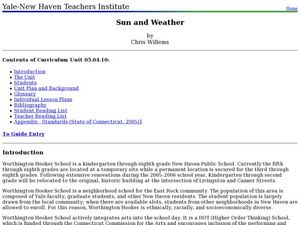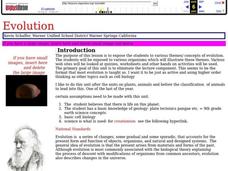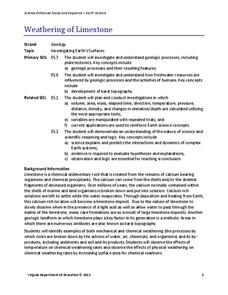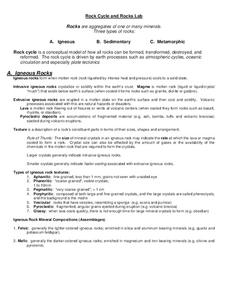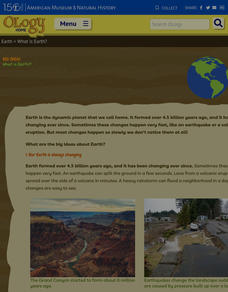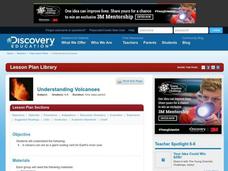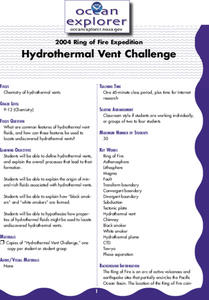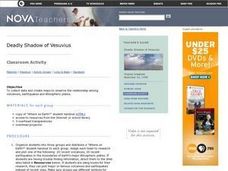Curated OER
Ride the Rock Cycle
Students identify the steps in the rock cycle. They complete a K-W-L chart before the lesson begins. They answer questions about the stages to complete the lesson.
Curated OER
Identifying Text Structure
Work on identifying text structure with this thorough worksheet. After studying a diagram depicting six different text structures (compare/contrast, spatial, chronological, problem and solution, cause and effect, and order of...
Curated OER
Sun and Weather
How is the Earth's weather created? Middle schoolers will explain how the Sun's energy is transformed into different forms. They will perform mathematical calculations of volume, mass, and temperature. They they will explain the...
Curated OER
Evolution
Explore the concept of evolution and cell biology; your class can work in groups to use the internet to view websites on evolution, take a quiz, and complete a lab activity.
Curated OER
Bats
Use Stellaluna by Janell Canon to discuss bats and other types of animals. Learners identify the differences between bats and birds, list the traits of mammals, create a Bat Facts game, and go on a written scavenger hunt. Fun, clever ideas!
Curated OER
Use Culinary Concoctions to Illustrate Geological Events
Incorporating food into your science lesson helps learners to visualize and taste the complex concepts of Geology.
Curated OER
The Oceans, Waves, Tides & Currents
Your introductory lesson to oceanography can be outlined with this apropos presentation. It touches on the physical features of the ocean floor, waves, tides, and currents. One small issue is that some of the graphics are not of the...
TED-Ed
Bringing a Pop-up Book to Life
Breath life into the pages of a text with this instructional video on creating pop-up books. From choosing a topic, through the planning and creation phases, this video examines how to develop engaging visual presentations that reach out...
Virginia Department of Education
Weathering of Limestone
We all know limestone weathers, but what affects the rate of weathering? Young scientists investigate the physical and chemical weathering of limestone (chalk) through experimentation. First, they conduct trials with different-size...
University of New Orleans
Rock Cycle and Rocks Lab
Science rocks! Explore three types of rocks and the rock cycle with an igneous rocks experiment. Pupils discuss textures, composition, and learn how melts are formed from the Earth's crust. They weigh materials using a scientific scale...
Science Matters
Spaghetti Fault Model
Does increasing the pressure between two moving plates provide a stabilizing force or create more destruction? The hands-on lesson encourages exploration of strike-split fault models. The sixth lesson in a 20-part series asks scholars to...
University of Southern California
What Is The Ocean?
Go on a tour of the ocean through the lens of a scientist. Learners read maps of the ocean floor, study tide behavior, examine wave motion, and analyze components of soil. Each lesson incorporates a hands-on component.
NOAA
Wet Maps
How do oceanographers make maps under water? Junior explorers discover the technologies and processes involved in creating bathymetric maps in part three of a five-part series designed for fifth- and sixth-grade pupils. The lesson...
American Museum of Natural History
What is Earth?
Humans have only inhabited Earth for a short part of its existence. An online resource explains how scientists use clues from rocks and fossils to piece together information about Earth prior to humans. The online instruction includes...
Curated OER
Tsunami
Students examine the impact of tsunamis. In this tsunami instructional activity, students read clues and use critical thinking skills to determine why the HMS Chatham was diverted from Dubai in 2004. Students also research tsunamis and...
Curated OER
2005 Submarine Ring of Fire Expedition: Unexplored
Students compare and contrast submarine volcanoes at convergent and divergent plate boundaries, infer kinds of living organisms that may be found around hydrothermal vents, and describe ways in which scientists may prepare to explore...
Curated OER
It's Going to Blow Up!
Students discover the major characteristics of volcanoes on the Pacific Ring of Fire. They describe the processes that produce the "Submarine Ring of Fire." students explain the factors that contribute to explosive volcanic eruptions.
Curated OER
Australian Mammals: Evolutionary Development as a Result of Geographic Isolation
Young scholars comprehend the difference between monotremes, marsupials, and placental mammals. They are able to compare and contrast these organisms (Australian mammals) with other mammals. Students are able to identify Australian...
Curated OER
Tetonic Plates and Faults
Students understand the basic properties of plate motion. They demonstrate what happens to a plate while faulting while using manipulatives. They demonstrate the Nature of Scientific Inquiry to solve scientific issues.
Curated OER
Exploring Alaska's Seamounts - Volcanoes, Plates, and Chains
Young scholars examine the formation of seamounts in the Gulf of Alaska. For this seamount lesson, student focus on how the Axial-Cobb-Eikelberg-Patton chain was formed. They learn the associated vocabulary, and watch a teacher...
Curated OER
Understanding Volcanoes
Students create a model volcano in groups, and discuss what each part of the model represents as they go along. In this volcano lesson plan, students come back together as a whole group and discuss what group did the best work,...
Curated OER
Earthquakes: Getting Ready For The Big One
Learners devise a plan to prepare a city for an earthquake. In this lesson on earthquakes, students differentiate between the different types of earthquakes, examine the impact they can have on a city, and write a proposal on how to...
Curated OER
Hydrothermal Vent Challenge
Learners discover common features of hydrothermal vent fluids. They use this knowledge to locate possible undiscovered hydrothermal vents on the ocean floor.
Curated OER
Deadly Shadow of Vesuvius
Students view a video clip about volcanoes. They collect data and create maps to see the relationship between volcanoes, earthquakes and plates. They share their maps with the class.
Other popular searches
- Plate Tectonics
- Tectonics Word Search
- Plate Tectonics Activities
- Plate Tectonics Pangaea
- Science Plate Tectonics
- Lessons on Plate Tectonics
- Theory of Plate Tectonics
- Plate Tectonics Lab Activity
- Modeling Plate Tectonics
- Evidence for Plate Tectonics
- Plate Tectonics Theory
- Plate Tectonics Word Search




